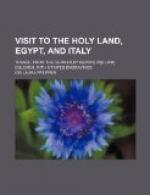The present town of Balbeck is partly built on the site occupied by its predecessor; it lies to the right of the temples, and consists of a heap of small wretched-looking houses and huts. The largest buildings in the place are the convent and the barracks; the latter of these presents an exceedingly ridiculous appearance; fragments of ancient pillars, statues, friezes, etc. having been collected from all sides, and put together to form a modern building according to Turkish notions of taste.
We were received into the convent, but could command no further accommodation than an empty room and a few straw mats. Our attendant brought us pilau, the every-day dish of the East; but to-day he surprised us with a boiled fowl, buried beneath a heap of the Turkish fare. Count Zichy added a few bottles of excellent wine from Lebanon to the feast; and so we sat down to dinner without tables or chairs, as merry as mortals need desire to be.
Here, as in most other Eastern towns, I had only to step out on the terrace-roof of the house to cause a crowd of old and young to collect, eager to see a Frankish woman in the costume of her country. Whoever wishes to create a sensation, without possessing either genius or talent, has only to betake himself, without loss of time, to the East, and he will have his ambition gratified to the fullest extent. But whoever has as great an objection to being stared at as I have, will easily understand that I reckoned this among the greatest inconveniences of my journey.
July 7th.
At five o’clock in the morning we again mounted our horses, and rode for three hours through an immense plain, where nothing was to be seen but scattered columns, towards the foremost promontories of the Lebanon range. The road towards the heights was sufficiently good and easy; we were little disturbed by the heat, and brooks caused by the thawing of snow-fields afforded us most grateful refreshment. In the middle of the day we took an hour’s nap under the shady trees beside a gushing stream; then we proceeded to climb the heights. As we journeyed onwards the trees became fewer and farther between, until at length no soil was left in which they could grow.
The way was so confined by chasms and abysses on the one side, and walls of rock on the other, that there was scarcely room for a horse to pass. Suddenly a loud voice before us cried, “Halt!” Startled by the sound, we looked up to find that the call came from a soldier, who was escorting a woman afflicted with the plague from a village where she had been the first victim of the terrible disease to another where it was raging fearfully. It was impossible to turn aside; so the soldier had no resource but to drag the sick person some paces up the steep rocky wall, and then we had to pass close by her. The soldier called out to us to cover our mouths and noses. He himself had anointed the lower part of his face with tar, as a preventive against contagion.




